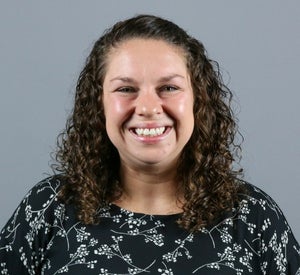I’m going to change the world. Well, maybe not exactly the whole world, but I’m going to make a difference in the lives of those around me. That may be someone’s world, their child, their parent or the love of their life, and I’m going to be the one who ensures they continue to live life fully.
I want to become an emergency medicine physician and a medical director.
I will elevate the scope of my practice to treat patients with the highest quality of care, while simultaneously supervising prehospital providers’ skills, knowledge and critical thinking to ensure they provide compassionate, evidence-based care.
Discovering Emergency Medicine
My passion for emergency medicine started back in spring of 2023. At the time, I was a full-time student at the University of Pittsburgh balancing multiple responsibilities: working part-time as an aquatic supervisor on campus while also being involved in several organizations such as Kappa Delta Sorority, Strong Women Strong Girls and the Pitt Pantry.
I enrolled in the Emergency Medical Technician (EMT) course through the School of Health and Rehabilitation Sciences (SHRS). Determined to gain meaningful clinical experience, I opted to take the course to gain my National Registry of Emergency Medical Technicians (NREMT) certification. It wasn’t long before I fell in love with the field of emergency medicine, specifically prehospital medicine which includes people like EMTs and paramedics who help patients before they arrive at the hospital. There is a profound sense of empowerment in being present and doing everything possible to support someone during their most difficult moments.
When I first applied to Pitt, I was officially undecided and remained so until the second semester of my sophomore year. My initial plan was to major in rehabilitation science on the pre-physician assistant track. I had applied to and been accepted into the SHRS Rehabilitation Science program, fully intending to pursue that degree. However, after absolutely loving the EMT course, I found myself regretting not applying to the Emergency Medicine program. When I learned that the application deadline for several SHRS programs had been extended, I decided to take a chance and apply. I was honored to be accepted and excited to pursue a path that truly aligned with my passions.
The Challenges and Rewards
The Pitt Emergency Medicine program is an upper-division paramedic training program designed for students to enter after completing their general education and prerequisites. It also offers a separate entry point for already certified paramedics. I enrolled in the upper-division entry point, which is structured in two phases.
During the junior year, students complete the comprehensive coursework and clinical experiences necessary to become certified paramedics. By the end of junior year, you are fully prepared to enter the field as a paramedic. The senior year then focuses on advanced emergency medical services (EMS) electives, with opportunities to pursue additional certifications in critical care and community paramedicine.
Unlike many undergraduate programs, Pitt Emergency Medicine students benefit from extensive hands-on training through clinical placements with EMS agencies and world-renowned health care institutions, providing invaluable real-world experience.
During the end of my junior year, I found myself loving the breadth of newfound skills that it took to become a paramedic. Being able to make critical decisions about my patients’ care became one of the most fulfilling aspects of the job. I thrived on the responsibility and autonomy that came with assessing complex situations, prioritizing interventions and acting decisively in high-pressure environments.
This program challenged me in ways I never thought possible, pushing me to grow both personally and professionally. From mastering advanced clinical skills to building lifelong friendships with my classmates, every moment was transformative. This experience not only solidified my desire to pursue emergency medicine but also instilled in me the resilience and dedication needed to excel in such a demanding field.
Additionally, every single faculty member I had the chance to learn from played a meaningful role in my experience. One of the most unique aspects of the program is how closely you get to work with each instructor. It’s not just about lectures and assignments, but about building genuine, supportive relationships. The faculty truly care about your growth, and their encouragement and mentorship helped me navigate challenges and develop a deep love for the field. One instructor in particular, Sarah Potts Johnson, made such an impact as she guided me through some of the most challenging parts of the program and deepened my resolve to forge a path in this field.

A Foundation for the Future
The Pitt Emergency Medicine program reinforced my desire to pursue a career where I could continue to help patients during their most vulnerable moments and it shaped my aspirations to advance further in medicine. I realized that I needed to become a physician.
The EM program gave me a strong foundation for my future career in medicine. Through hands-on experience, exposure to real clinical environments and close mentorship, I developed both the practical skills and the confidence needed to thrive in high-pressure settings. I truly feel prepared and excited for what comes next.
I hope to become not only a skilled emergency medicine physician but also a trusted medical director leading EMS teams and providing them with ongoing education, mentorship and support. By fostering a culture of collaboration, innovation and compassion, I aim to strengthen the bridge between prehospital care and the hospital system. The EM program definitely helped prepare me for the position of leadership that I desire. It challenged me to think critically, communicate clearly and stay calm under pressure, all essential traits for any leadership role.
The confidence and skills I gained through the program also made me feel much more prepared to take on my council position as Kappa Delta Xi Chapter’s Panhellenic Delegate during my senior year. I was able to lead with greater purpose, collaborate effectively with others and represent my chapter with a strong sense of responsibility and professionalism.
My ultimate goal is to make a meaningful difference in the lives of others, and I’ve been working toward that goal at every stage of my career. As an EMT, I learned the importance of quick thinking and compassionate care in the most critical moments. Now, as a paramedic, I continue to build on that foundation, providing life-saving interventions and supporting patients through some of their most vulnerable experiences. In the future, as a doctor, I know I will have the opportunity to expand my impact even further, not only through direct patient care but also by leading and mentoring future generations of health care providers.
I don’t need to wait for my future to work toward my goal. I can—and do—make an impact now with every patient I treat, and with every opportunity I learn and grow.

